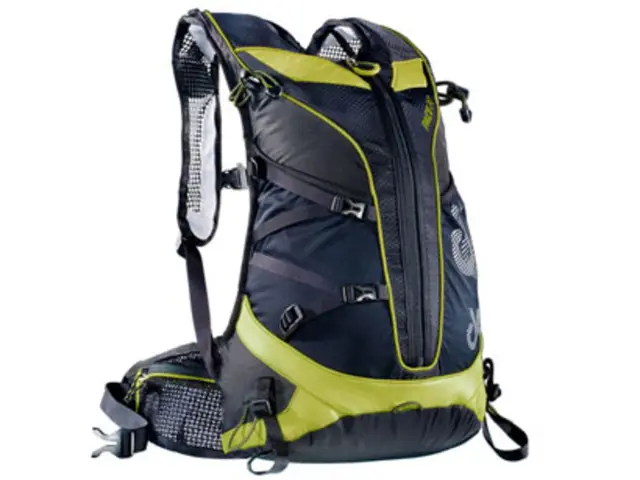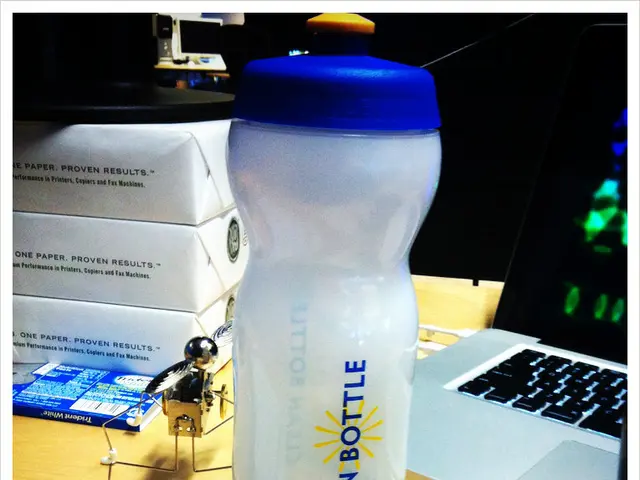Saving Lives with Tech-Savvy Good Samaritans: Here's How Mobile Apps in the Heart of Europe are Revolutionizing First Aid Response
- *
Utilizing the Nearby feature, a life-saving application assists individuals in crisis situations - Locating Assistance Swiftly: The Life-Saving Benefits of Emergency App Alerts
Every second counts when a heart stops. Across Germany, volunteer firefighters, nurses, and even doctors, learn how to become unlikely lifesavers using first aid knowledge, smartphones, and the power of chance. These community heroes are part of a growing network known as Mobile Rescuers, a lifesaving initiative brought to life by an app.
But this rapidly expanding network could be even greater, according to emergency physicians. To have the most significant impact, they argue, it needs to grow denser.
The groundbreaking Mobile Rescuers app, Germany's pioneering first aider alerting system, now links nearly 22,500 participants across almost 40 cities and districts in six federal states. And they're out to save lives.
Minutes mean life and death
The math is simple: Over 120,000 people nationwide suffer sudden cardiac arrest outside a hospital each year. Only one in ten survives due to the routine nine-minute response time of the rescue service. First aider apps, already established in Scandinavia and the Netherlands, can make all the difference, experts from the Björn Steiger Foundation stress in a position paper.
"After three minutes, the brain starts to die," explains Fire Department Chief Inspector Jan Kuhlmann, responsible for Mobile Rescuer training in Essen. With increased use of the mobile system across Germany, he hopes to bridge the gap between life and death.
Essen City's Bulwark Against Emergencies
For several years, Essen has been one of the first major city control centers to adopt the Mobile Rescue principle. In rural areas, long distances, and in cities, heavy traffic make quick help tough. But with the Mobile Rescuer system, every second counts.
The lifesaving idea for the app came from emergency physician Ralf Stroop. Seeing an ambulance's flashing lights in his neighborhood, he realized he could have helped earlier had he known about the emergency beforehand. That was the spark.
In Essen alone, over 1,000 helpers have come into action over 1,900 times since the app's introduction, and they arrived at the scene an average of three and a half minutes after receiving an alert - often before the rescue service [2].
An intricate web of lifesaving systems
In Germany, at least six different first aider app systems are in use, including the "Region of Life Savers" (mainly in Baden-Württemberg), the "Corhelper" app, and Schleswig-Holstein's statewide system.
Despite the patchwork of systems, Mobile Rescuer CEO Stefan Prasse is optimistic. "While each system may have its unique features, we all share the common goal of saving lives," he emphasizes.
Currently, representatives of various providers are working on establishing common standards, ensuring that the systems remain interoperable. But technology alone will not suffice: proactive volunteer management is vital to ensure continued interest among participants [1].
First AiderFirst AidGermanyLife SaversMobile RescuerScandinaviaNetherlandsEmergency ResponseApp-based First Aid
References:[1] Stichter, S. (2022). Mobile Rescuer: Die „world first“-App für die Ersten Hilfe. Aberdeen International. https://www.aberdeen-international.com/mobile-rescuer-de/
[2] Björn Steiger Stiftung. (2022). Wie hilft der Erste Helfer bei einem Herzstillstand? https://www.bssh.de/themen/herzstillstand-erste-hilfe/
[3] European Resuscitation Council. (2020). European Resuscitation Council guidelines for resuscitation 2021 – Section 6: Community and public awareness, resuscitation training, and first responders. Resuscitation, 162, 10-45. https://doi.org/10.1016/j.resuscitation.2020.09.005
[4] Sitzmann, B. (2021). Erste Hilfe Apps: Die Kombination von Smartphone und Technik verhindert testsweise radioaktive Müllansammlungen. Essen Classic Cars. https://essen-classic-cars.de/2021/11/erste-hilfe-apps-kombination-smartphone-technik-verhindert-testsweise-radioaktive-muellansammlungen/
[5] Deutsches Ärzteblatt. (2021). Mobile Rescuer Pros und Kons. https://www.aerzteblatt.de/nachrichten/bundesgesundheit/33315547/mobile-rescuer-pros-und-kons
- In the heart of Europe, the intersection of science, health-and-wellness, and technology is creating a new era in first aid response, as community heroes leverage vocational training and mobile apps to revolutionize emergency assistance.
- As the Mobile Rescuer initiative expands, it's not just technology that matters; proactive volunteer management is crucial to ensure continued interest among participants and densify the network for maximum impact in saving lives.








